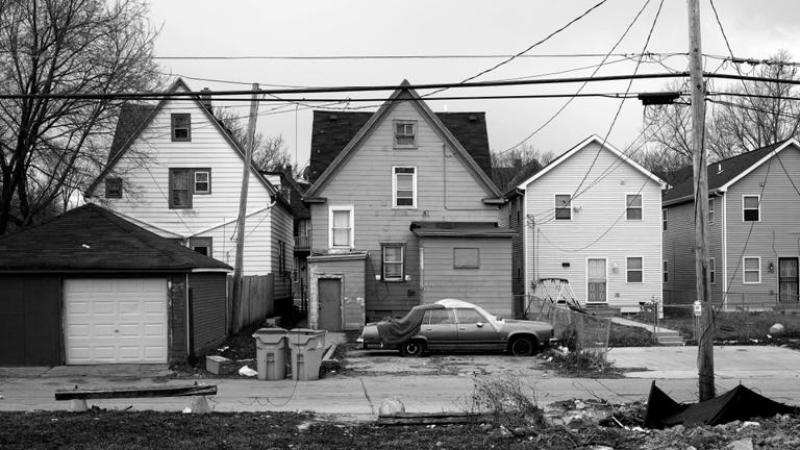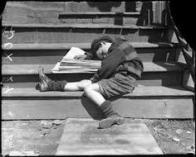The One Cause of Poverty That’s Never Considered


What if the persistence of poverty has less to do with the misfortunes of the needy than with the advantages the affluent presume they are entitled to? In Poverty, by America , Matthew Desmond, a sociologist at Princeton, argues that we need to examine the behavior and priorities not of the poor but of “those of us living lives of privilege and plenty.”

I n the United States, a staggeringly wealthy country, one in nine people—and one in eight children—is officially poor. Those figures have fluctuated only slightly over half a century, during which scholars and journalists have exhaustively debated the reasons for the lack of progress. Training their attention on the lives of the dispossessed, researchers have identified barriers that keep people at the bottom of the social ladder from climbing its rungs, and offered arguments that usually play out along ideological lines. According to conservatives, the most significant obstacles are behavioral: family breakdown and debilitating habits such as dependency and idleness, exacerbated, they believe, by the receipt of government handouts. According to liberals, the real problems are structural: forces such as racism and deindustrialization, which, they contend, have entrenched inequality and prevented disadvantaged groups from sharing in the nation’s prosperity.
.....The safety net in America is more threadbare than in most wealthy countries. But growing government stinginess over the years doesn’t explain the high number of destitute people, author Matthew Desmond argues, citing a surprising figure: Government spending on the 13 largest means-tested programs—targeted at people under a certain income level—has actually risen 237 percent from 1980 to 2018. Neither does the emphasis on the breakdown of the family and the rise in single-parent households, a theme of the 1965 “Moynihan Report” that has had a long afterlife. It’s true that families in the United States headed by single mothers are far more likely to be poor than married families, Desmond acknowledges. But the disparity vanishes in countries such as Italy and Sweden, thanks to social programs (affordable child care, paid family leave) that aren’t available here. In this respect, the lack of government spending clearly has played a role.
Desmond is equally dismissive of theories that focus on impersonal structural problems as the main impediments. It’s not that he discounts the significance of such factors—in Evicted , he described Milwaukee as “the epicenter of deindustrialization,” and he takes pains to document how racism and poverty intersect. But he is impatient with the implication that poverty arises passively, because of large forces beyond our control. To the contrary, poverty is a social reality that Americans create and sustain—and from which many of the nonpoor benefit materially in more direct ways than they care to acknowledge. Desmond’s mission is to disabuse the better-off among us of the illusion that they are mere bystanders with their hands tied. Many wealthy people assume that the built-in advantages that come with affluence are their due, and take for granted their freedom to choose among many life options. What they fail to recognize is that their choices contribute to foreclosing options for people of lesser means, whose lives are already far more constrained.
.....how exploitation in various forms is the root of the problem. Housing, unsurprisingly, figures in the foreground of his analysis. When renting apartments, the poor are routinely forced to pay more, because landlords know they lack good alternatives because of the dearth of public housing. But poor renters also suffer at the hands of a less familiar cast of exploiters: educated and affluent people who impinge on their choices and benefit from their powerlessness more subtly but no less consequentially.
The imposition of “municipal zoning ordinances,” enacted through referenda pushed by citizens’ groups and homeowners’ associations, and which prohibit the construction of multifamily apartment complexes in upscale neighborhoods, is a case in point. These benign-sounding rules foster segregation, effectively preventing the poor (whose presence, it’s assumed, could drive down property values) from moving in—which, in turn, consigns them to neighborhoods of concentrated disadvantage. As Desmond notes, such policies are one of the few issues that Americans in red and blue states seem to agree on. A study he cites found that liberals and conservatives were pretty much equally unlikely to support building a 120-unit apartment complex for housing-voucher recipients in their community.
In Desmond’s taxonomy of how the privileged “make the poor in America poor,” the strategy of living in walled-off communities—and more broadly, the proclivity to invest in private amenities at the expense of public housing, education, and transportation—has more than an economic impact. The physical separation also “poisons our minds and souls,” enabling affluent people to forget about the poor and obscuring two other tiers of economic exploitation that Desmond calls attention to.
Surveying a host of other perks and benefits to which the well-off consider themselves entitled, he emphasizes that such life amenities are available only because poor people suffer: When the wealthy patronize shops and restaurants that offer low prices and fast service, their satisfaction comes at the expense of cashiers and dishwashers paid poverty wages. When we open free checking accounts that require maintaining a minimum balance, we benefit from the fact that banks can collect billions of dollars in overdraft fees from poor customers who struggle to meet these requirements—and who often end up gouged by check-cashing outlets and payday lenders.
“Anyone who has ever struggled with poverty knows how extremely expensive it is to be poor,” James Baldwin once observed, an irony that still prevails in America. Finally, Desmond flags the provision of federal welfare—the tax breaks and subsidies (among them the mortgage-interest deduction, a very large housing perk) reserved for the haves, which far outstrip the programs and benefits that assist the have-nots. The average household in the top 20 percent income bracket receives $35,363 in annual tax breaks and other government benefits—40 percent more than the average household in the bottom 20 percent. Federal spending, Desmond reminds readers, is a zero-sum game—a game the wealthy and powerful invariably dominate.
D esmond’s emphasis on the link between wealth and poverty, and on class exploitation, may lead some readers to brand him a Marxist. His thinking about poverty indeed owes a debt to an influential 19th-century writer, but the writer in question isn’t Marx. It’s Leo Tolstoy, who, after publishing Anna Karenina , moved to Moscow, where the poverty he witnessed shocked him. As Desmond recounts, the experience prompted the writer, who lived in a house full of servants, to contend with his complicity and shame. “I sit on a man’s back, choking him and making him carry me, and yet assure myself and others that I am very sorry for him and wish to ease his lot by all possible means—except by getting off his back,” Tolstoy mused. “If I want to aid the poor, that is, to help the poor not to be poor, I ought not to make them poor.”
Desmond has written his book in the hope that exposing our complicity will catalyze a similar crisis of conscience. Shifting into exhortation mode, he invokes Tolstoy’s realization as a model for the “poverty abolitionists” that America needs and that he hopes to mobilize into a movement. As he presses this case, Desmond sometimes sounds less like a dispassionate social scientist than a missionary, convinced that the privileged can be moved to act if only they open their eyes and acknowledge how implicated they are in the suffering of the poor. Yet Desmond’s own map of the entrenched ways we keep the disadvantaged down can’t help but raise doubts about how many converts he will persuade to join such a crusade.
Tolstoy’s epiphany was inspired by proximity: He had to see poverty up close to viscerally experience shame and responsibility. In Evicted , as in his new book, Desmond emphasizes that poverty is a relationship in which we are all enmeshed. In doing so, he’s pushing back against a long-standing emphasis on the isolation and invisibility of the poor, a theme in some of the best-known literature on poverty—from Jacob Riis’s How the Other Half Lives (1890) to Michael Harrington’s The Other America (1962) and beyond. But even as he insists that “our lives are interlaced with the lives of the poor,” Desmond himself describes a “bifurcated” country divided by ever more impenetrable barriers that keep the poor in their place: out of expensive neighborhoods, in low-wage jobs, at schools and day-care centers that children from wealthier families don’t attend. A society in which the poor and nonpoor so rarely brush shoulders is, as he’s shown, a society designed to allow the affluent to not see how they benefit from others’ hardships. (In cities like New York and Los Angeles, where homeless people are more visible, it’s also notable that many of the proposed solutions are to get the poor out of sight rather than to direct resources toward them.)
Desmond is convinced that the time is ripe for a manifesto like his. The growing awareness of inequality may indeed have shifted popular attitudes, making Americans less inclined to view the poor as lazy and undeserving than was the case during the Reagan years or the 1990s, when Bill Clinton announced that the “era of big government is over” and enacted welfare reform. But there are also reasons to wonder if the current moment is an auspicious time for a large-scale push to end poverty. The War on Poverty was launched in an age of prosperity, when many believed the economy was strong enough to lift all boats. In times of insecurity like ours, when workers in the hollowed-out middle fear slipping downward, the zero-sum game gets only more intense.
What is “maddening,” Desmond writes, is “how utterly easy it is to find enough money to defeat poverty by closing nonsensical tax loopholes,” or by doing 20 or 30 smaller things to curtail just some of the subsidies of affluence. Yet his book makes it all too clear why the loopholes don’t get closed. The real reason the well-off sustain the status quo isn’t that they believe the poor are shiftless. It’s because meaningful change would require giving up their own advantages—or, to put it bluntly, because “we like it,” as Desmond writes. This is, he notes, the “rudest explanation” for our current state of affairs. Getting affluent people to engage in rhetorical hand-wringing over inequality is easy enough. Persuading them to yield some of their entitlements is a lot harder.







Hardly, it’s a deficit-sum game.
Exactly, big government adds complexity to the rules that the wealthy and big businesses are best positioned to take advantage of.
I find it fascinating that our political class loves to talk about working for the poor but in reality if they end poverty they will lose one of their most effective campaign issues. None of them care, not a single one. They take office and by the end of most of their second terms they have accumulated an insane amount of wealth inside trading, legally looting their campaign war chests and prostituting for lobbyists. I know your favorite politician is different, after all you voted for them.
If we have any hope of making a dent in poverty we must first reform our political system dramatically. Any other approach will yield the same failed results.
In any society, there will be haves, and have-nots. The poor will always be with us.
What's the solution?